Table of Contents
The texts of the two trials of Gilles de Rais were based on the minutes and annotated by Georges Bataille.
The Latin text of the ecclesiastical trial was translated into French by Pierre Klossowski.
This book was originally published as Le Procs de Gilles de Rais, 1965 by Jean-Jacques Pauvert, Paris
Cover Design: Tom Dolan
English Translation 1991 Richard Robinson
ISBN 1-878923-02-1
AMOK Books are available to bookstores through our primary distributor: The Subterranean Company, Box 168, 265 South 5th Street, Monroe, Oregon 97456.
Phone: (800) 274-7826. FAX: (503) 847-6018.
UK Distributors: Turnaround Distribution, 27 Horsell Road, London N5 1XL.
Phone: 0171-609 7836/7. FAX: 0171-700 1205.
Non-bookstore Distribution: AK Press Distribution, P. O. Box 40682, San Francisco, California, 94140-0682. Phone: (415) 923-1429. FAX: (415) 923-0607.
For personal orders and to request a complete Amok Books catalog, please write to Amok Books, 1764 N. Vermont Avenue, Los Angeles, California 90027.
Phone: (213) 665-0956. FAX: (213) 666-8105.
ACKNOWLEDGMENTS
The publishers would like to thank Matias Viegener for his extensive editing of the translation of Batailles writings, and Nikki Halpern for her extremely thorough editing of the trial documents. Their contributions were integral to the shaping of this project.
We would also like to thank Melissa Hoffs for her painstaking proofreading and accomplished revisions of various drafts; Peter Wollen for his advice; Michael Intriere for his production expertise; and Sarah Koplin, Monica Moran and Michael Sheppard for their additional editorial assistance.
FOREWORD
Abbot Bossard wrote that the trial of Gilles de Rais was in all things the polar opposite of Joan of Arcs. But he adds that together they compose the two most celebrated trials of the Middle Ages and perhaps also of modern times. We have known other exciting trials since then, but something here holds true. And if it is true that Abbot Bossards book, the most important as yet dedicated to Gilles de Rais, is obsolete today, this is not the case with the trial documents: this is not the case with these most terrible documents. At one time published in a defective form, however, the texts are unobtainable today. One can see their republication here; they have been the object of a long and meticulous study, which we hope proves worthy of the exceptional interest of the document.
In the second part of the introduction we have held ourselves to saying whatever was known of this individual, as it seemed to us. We have added to this a certain number of historical facts, given in chronological order whenever possible.
N.B. For place names, we have followed the current, officially designated usage. However, we have made an exception of Rais. We have not followed the currently accepted spelling, which is Retz . In fact this spelling involves an absurd pronunciation. In the 15th century it was most often written as Rais, or occasionally Rays. The pronunciation, always observed in the region, was ray . We have gotten rid of the y , which is nothing but an idle embellishment.
For the names of people, we have striven to give the most probable spelling, taking into consideration the incoherence and fancy of that given in the texts. Let us specify only that each time the texts give the spelling cz (e.g.: Princzay), or cs , we have written c ( e.g.: Princ), which corresponds to the pronunciation.
The Tragedy of Gilles de Rais
THE TRAGEDY OF GILLES DE RAIS
The Sacred Monster
Gilles de Rais owes his lasting glory to his crimes. But was he, as some affirm, the most abject criminal of all time ? In essence, this speculative affirmation is barely defensible. Crime is a fact of the human species, a fact of that species alone, but it is above all the secret aspect, impenetrable and hidden. Crime hides, and by far the most terrifying things are those which elude us. On the night marked out by our fear, we are bound to imagine the very worst. The worst is always possible; and also, with crime, the worst is the last thing imaginable.
That is why more than the actual crimes legend, mythology, literature, and, above all, tragic literature set the standard of our fear. We can never forget that it is crimes legendary aspects alone that have ordained the truth of crime.
That said, we cannot enter upon the story of Gilles de Rais without granting him his privileged place. In the end, we cannot leave the evocative power held in everyday reality unmentioned. And faced with Gilles de Rais crimes, we do get the sense, perhaps misleading, of a summit. His nobility, his immense fortune, his lofty achievements, and his execution in front of a scandalized crowd (which was perplexed, however, by his remorse and his many confessions and tears) consummate his apotheosis.
Undoubtedly, nothing completely vindicates the passion of the crowd that flocked to his execution. Gilles de Rais was simply a brutal man of war, a powerful nobleman without discretion, without scruples. Nothing designated him for the final sympathy of that crowd. His violence at least warrants the astonishment provoked by such an uncalculating and, as it were, bewildered passion. The violence of remorse corresponded, in effect, to the sick violence of vice, which brought this criminal to so many murders. Popular emotion was the consequence of the excess that had commanded a life never dominated by calculation. Gilles de Rais is a tragic criminal. The main constituent of tragedy is crime, and this criminal, more than any other perhaps, was a character of tragedy.
We must picture these sacrifices of dead children, which kept on multiplying. Let us imagine an almost silent reign of terror which does not stop growing, and for fear of reprisals the victims parents hesitate to speak. This anguish is that of a feudal world, over which are cast the shadows of massive fortresses. Today, tourists are attracted to the ruins of these fortresses; then they were monstrous prisons, and their walls evoked torments of which they only occasionally muffled the cries. In the presence of Gilles de Rais fairy-tale castles, which people will later call the castles of Bluebeard, we ought to recall these butcheries of children, presided over not by wicked fairies, but by a man drunk with blood. His crimes arose from the immense disorder that was unwinding him unwinding him, and unhinging him. By the criminals confession, which the scribes of the trial took down while listening, we also know that sensual pleasure was not of the essence. Ostensibly he would sit on the belly of his victim and, in this fashion, masturbating, come on the dying body; what mattered to him was less the sexual enjoyment than to see death at work. He liked to watch. He had the body cut open, the throat cut, the members carved to pieces; he relished seeing the blood.
However, only one last satisfaction was missing for him. Gilles de Rais fancied himself a sovereign lord. As Marshal of France, after the victory at Orlans and the consecration of Charles, he had himself bestowed with quasi-royal arms. He rode preceded by a royal escort, accompanied by an ecclesiastical assembly. A herald of arms, two hundred men, and trumpeters announced him; the canons in his chapel, a kind of bishop, cantors, and the children in his music school made up his retinue on horseback, glittering with the richest ornaments. Gilles de Rais wanted to be dazzling, to the point of ruinous expenditure. In providing for the necessities that his delirium commanded, he liquidated an immense fortune without thinking. Some sort of dementia was at the heart of his propensity to spend money; he underwrote great theatrical performances accompanied by gifts of food and drink. He was compelled to fascinate people at all costs, but he lacked what a criminal quite often lacks on this order of things; this makes him recognize, in his confession, his excessive display of what necessarily should have remained hidden: his crimes


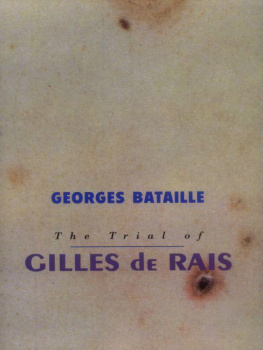




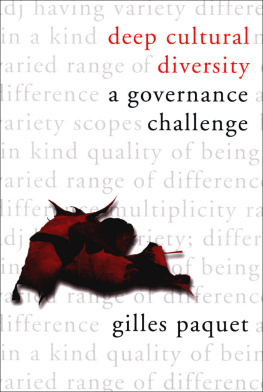
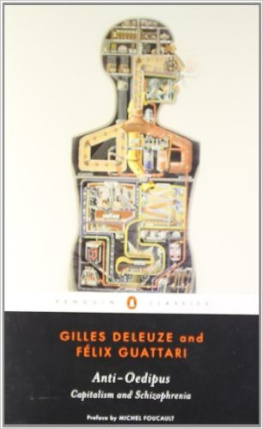

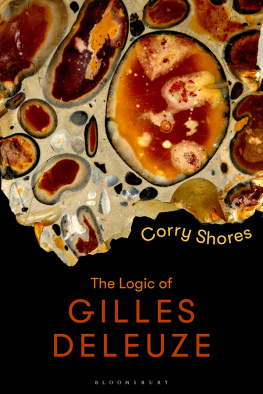

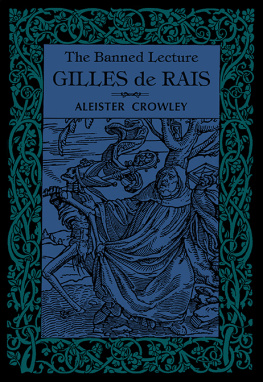
![Gilles Dowek - Introduction to the Theory of Programming Languages [recurso electrónico]](/uploads/posts/book/137340/thumbs/gilles-dowek-introduction-to-the-theory-of.jpg)
